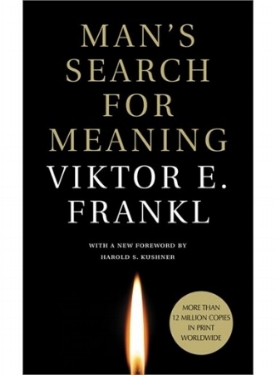Summary:
Viktor Frankl, a Jewish psychiatrist during World War II, was sent to four different concentration camps including the infamous Auschwitz. During his time in the camps, he observed prisoners and himself, to reflect on what made some people mentally tough and why some people survived while others died or committed suicide.
In the camps, he was forced to assess whether his own life still had any meaning. Prisoners worked over ten hours a day of physical labor in freezing temperatures with not much more than a shirt, pants, and slippers. Most days they were given only one bowl of soup and a piece of bread.
After spending several years in the concentration camps, the war finally ended and Frankl became a free man. Frankl would go on to become the founder of logotherapy, a form of psychotherapy that focuses on the pursuit of meaning in one's life. He also wrote several books about logotherapy, his time in the camps, and the meaning of life.
An image of a young Viktor Frankl.
Lessons:
1) Love is an incredibly powerful force
“Then I grasped the meaning of the greatest secret that human poetry and human thought and belief have to impart. The salvation of man is through love and in love. I understood how a man who has nothing left in this world still may know bliss, be it only for a brief moment, in the contemplation of his beloved.”
While in the camps, prisoners were forced to work long hours of physical labor in harsh environments with poor equipment. Although he was in a horrible situation, Frankl could cheer himself up by thinking of his wife.
Due to the horrible conditions in the camps, Frankl was suffering every day, but the thought of seeing his wife again gave him a feeling of fulfillment and encouragement. Although Frankl had no idea whether or not his wife was alive, he says it didn’t make much of a difference. Even if she wasn’t alive, he still loved her spirit.
In his mind, Frankl was reliving all of the wonderful memories he and his wife have had during their time together and sometimes cried of happiness while doing so.
2) All Man Has Is His Attitude
“Everything can be taken from a man but one thing: the last of the human freedoms–to choose one’s attitude in any given set of circumstances, to choose one’s own way.”
Upon entering the concentration camp for the first time, the Nazi soldiers took everything from the soon to be prisoners including their clothes, jewelry (wedding rings as well), and documents.
Prisoners were separated from their families, shaved, and given a prison number that was tattooed on their arm.
When everything is taken from a person, there is only one thing left, their attitude.
Their attitude determines the decisions they make every day and every hour within that day. Prisoners in the camp all experienced lack of sleep, insufficient food, and various mental stresses. Yet, some prisoners still gave away their last piece of bread to others or helped them when they got injured.
Frankl says that a person is made as a result of their inner decisions and not the result of outside influences alone. Even in an extreme environment, like a concentration camp, man can still retain his human dignity.
3) The Meaning of Life and Suffering
“We must never forget that we may also find meaning in life even when confronted with a hopeless situation when facing a fate that cannot be changed. For what then matters is to bear witness to the uniquely human potential at its best, which is to transform a personal tragedy into a triumph, to turn one’s predicament into a human achievement.”
According to Frankl, the meaning of life can be discovered in three ways:
- By creating a work or doing a deed
- By experiencing something or encountering someone
- By the attitude we take toward unavoidable suffering
The first two are quite obvious, the first method often involves a person’s career or what they do to give back to others while the second is often referred to as experiencing goodness, love, and beauty. However, the third needs further elaboration.
Frankl says that meaning in life can be found even in hopeless situations. Throughout history, humans have been found to have almost endless potential. Many people have been able to turn their tragedy into a triumph–an amazing achievement that humans are capable of doing. Frankl is one example of this, the odds of surviving in a concentration camp were one in twenty-eight.
Frankl writes that suffering ceases to be suffering at the moment it finds a meaning, such as the meaning of sacrifice (example: People suffer at the dentist but the dentist is needed to be healthy, people suffer when running a marathon but they find meaning in finishing the race).
Although suffering is not necessary to find meaning, meaning can be found in suffering.
One meaning in life that Frankl discovered through his suffering is that man is capable of extreme evil as well as extreme good. Frankl saw stick-thin prisoners offering their one piece of daily bread to those in dire need and even a few Nazi guards helped Frankl survive by giving him advice or supplies.
Conclusion:
Love is a powerful emotion, have a positive attitude, and be aware that meaning can be found in suffering. Overall, Man’s Search for Meaning is definitely worth reading. It’s a quick read and an amazing story of the human spirit and the potential of mankind, both good and bad.
Rating: 5/5 Stars
If you’re interested in getting the book, click here or on the image below.
If you enjoyed this article, I highly recommend learning about the psychologist Jordan Peterson and his book "12 Rules for Life."
Please consider supporting our site here or signing up for our monthly newsletter here. Thank you!
Reader freebies:


